How to protect your memory
Adjusting your diet to take in more flavonoid-rich foods can give the mind a lift. Here are the items to add to your shopping list.
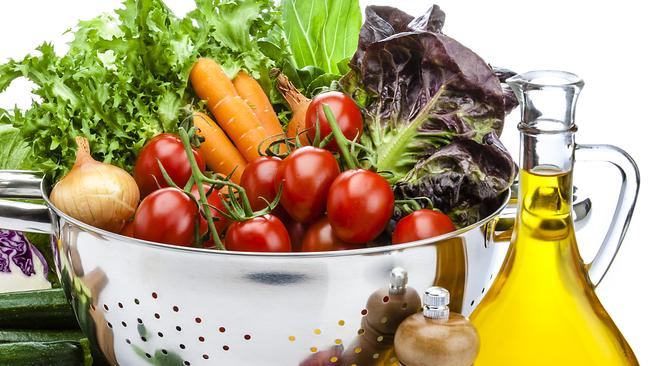
A new rule for boosting brain health is to take a regular tea break or to finish the day with an occasional glass of red wine. This week researchers from Rush University Medical Center in Chicago reported that both drinks provide enough beneficial flavonols to keep your memory sharp as you age. Flavonols are a type of flavonoid, a group of plant chemicals known to reduce the sort of inflammation in the body that underlies many age-related health problems. Along with other types – including flavones and flavanones – they play a role in slowing cognitive decline as we get older. The new study suggests that the more flavonols you can get in food, the slower the onset of forgetfulness.
While tea is a practical way to get your daily dose of brain-boosting plant compounds, and wine a desirable one – although too much alcohol can backfire for brain health – they are not the only sources of flavonols. According to the neuroepidemiologist Thomas Holland, who led the study of 961 people with an average age of 81, many plant-based foods, including red wine, fruits and vegetables, are excellent sources.
“Something as simple as eating more fruit and vegetables and drinking more tea is an easy way for people to take an active role in maintaining their brain health,” he says.
In his trial the average dietary intake of flavonols among participants was approximately 10mg a day. Those people with the highest intakes – an average of 15mg daily, the equivalent of two servings of dark leafy greens or two cups of tea – had the lowest rates of cognitive decline compared with those who had an intake of about 5mg a day.
The findings follow a study last year at Harvard University. Researchers calculated the total flavonoid intake of more than 77,000 middle-aged men and women with an average age of 51 over two decades. When they drilled down to find out whether specific types of the plant compounds were more beneficial to brain health than others, they discovered that flavones, found in onions and kale, for example, were associated with a 38 per cent lower risk of self-reported cognitive decline, while flavanones in oranges and grapefruit were associated with a 36 per cent reduced risk and anthocyanins in dark berries a 24 per cent lower risk.
You don’t need much of any of these to reap results. Eating at least half a serving a day of flavonoid-rich foods seems to have significant brain-protecting effects – although the greater the variety of foods containing them the better.
“Fruits and vegetables tend to contain several types of flavonoids, along with many other nutrients and fibre, so the best approach is to eat as many different types as you can,” the nutrition therapist Ian Marber says.
“If you get your five-a-day or more, you will be having a good intake of flavonoids that can potentially help brain health.”
Tea is one of the top choices, and here are nine others to make up your top ten brain-boosting foods.
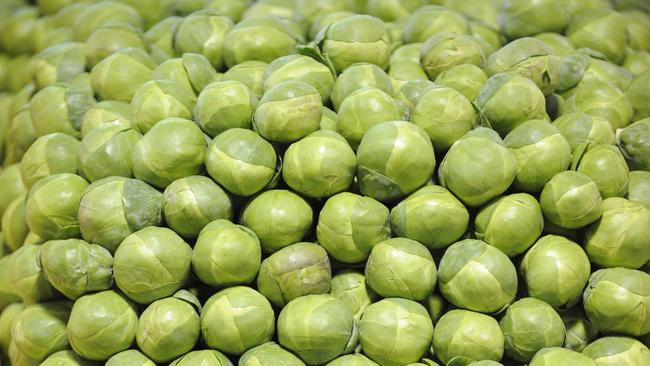
BRUSSELS SPROUT
Sprouts topped the list of fruits and vegetables most associated with beneficial effects in the Harvard study. They’re packed with vitamin K, higher circulating concentrations of which are associated with better cognitive function in older adults. They contain sulforaphane, which has antioxidant, anti-inflammatory and brain-protecting properties, and the flavonoids quercetin and kaempferol. Eat them no more than once or twice a week – the Harvard team suggest that high intakes can have adverse effects.
BROCCOLI AND CAULIFLOWER
These two are excellent suppliers of brain-protecting sulforaphane, as well as of flavonoids including kaempferol, although some researchers have found that there is a higher total flavonoid content in cauliflower leaves than in florets, so chuck them in as well.
Cauliflower contains choline, important for the formation of neurotransmitters that allow essential brain functions to take place. In a study involving 13,388 women, those with the highest intakes of cruciferous vegetables, including broccoli and cauliflower, were shown to have the lowest rates of cognitive decline.
DARK BERRIES
Blueberries, blackcurrants and blackberries are particularly high in anthocyanins, a type of flavonoid associated with a 24 per cent reduced risk of cognitive decline in the Harvard study. Aedin Cassidy, a professor of nutrition and preventive medicine at Queen’s University Belfast, has discovered that these berry anthocyanins have brain-protecting effects, increasing blood flow to key areas of the brain and helping to prevent the decline in memory that is a risk factor for neurodegenerative diseases such as Alzheimer’s.
“We should eat more berries as they are extremely helpful for a range of degenerative diseases, including those of the brain,” Cassidy says. Blueberries provide 164mg of anthocyanins per 100g serving, one of the highest amounts of all dark berries, but “a mixture is best”.
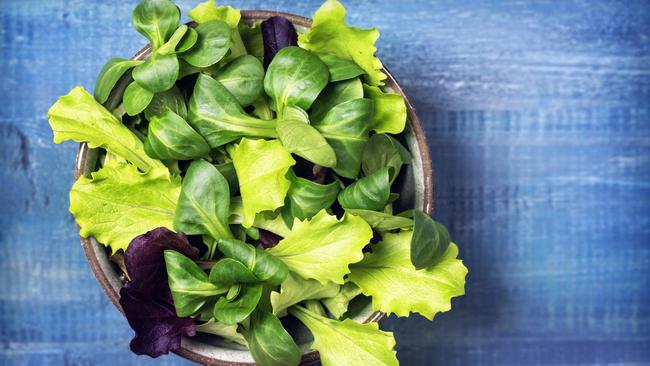
GREEN VEG
Leafy greens – from spinach to kale and cabbage to lettuce – are considered a brain food staple because they provide a high ratio of essential brain nutrients including vitamin K, lutein, folate and a range of flavonoids.
One 100g serving a day of leafy greens was previously shown by the Rush University team to slow age-related cognitive decline, with people eating two or more servings typically displaying the memory and recall skills of someone 11 years younger.
Each veg differs slightly in its flavonoid content, spinach and broccoli being particularly rich in the flavonol kaempferol, shown to reduce memory impairment. People with the highest intake of kaempferol in Holland’s study had a 0.4 units per decade slower rate of cognitive decline compared with those with a low intake.
ORANGES
With about 43mg of flavonoids per 100g, oranges are a great addition to your diet. While juicing the fruit reduces fibre and can produce a higher blood sugar spike after consumption, it doesn’t much affect the flavonoid activity. Men asked to drink a glass (240ml) of orange juice achieved improved scores for attention and other brain functions immediately after drinking, with effects lasting up to six hours compared with when they consumed a placebo. “It’s always better to consume a fruit or vegetable in its whole form rather than as a juice,” Marber says. “But an occasional glass won’t harm.”
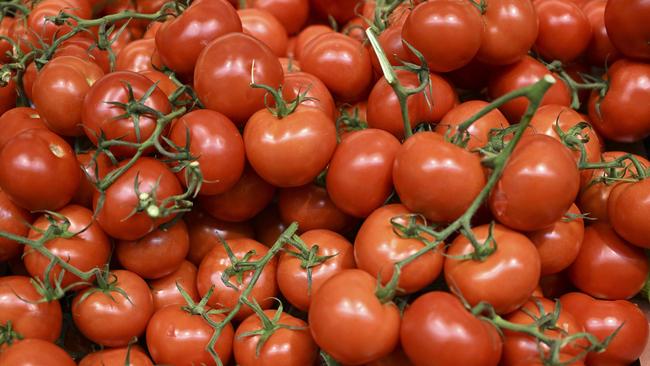
TOMATOES
Whether you eat tomatoes whole, cooked in a sauce or juiced, they will have brain-boosting benefits. In Holland’s study tomatoes were shown to be a significant source of quercetin, a flavonol with known brain-protective effects, and naringenin, a flavonone present in high amounts in the peel of tomatoes, and in grapefruit, and which has been shown to enhance brain health.
The Chicago scientists found that people with the highest intake of quercetin had a 0.2 units per decade slower rate of cognitive decline compared with those in the lowest group. Tomato sauce is an option since it is rich in the flavonoid isorhamnetin, which improves the health of human brain cells.
“Other compounds in tomatoes have brain benefits, including lycopene, an antioxidant present in high amounts when tomatoes are cooked, which is known to reduce oxidative stress that can damage the brain,” Marber says.
COCOA
Flavanols – a different subsection of flavonoid to flavonols – in cocoa and chocolate can boost brain oxygenation and improve performance in tests of cognitive skill. That’s the finding of a group of brain health scientists at the University of Birmingham who reported their findings in the journal Nature.
Catarina Rendeiro, a researcher in nutritional sciences and one of the authors, gave 18 participants a high-quality, flavanol-rich cocoa or a processed cocoa drink with very low levels of flavanols two hours before asking them to breathe in air with 5 per cent carbon dioxide, 100 times higher than the normal concentration. The aim was to assess how the arteries supplying blood to the brain responded while they were faced with completing a set of complex tasks such as quizzes and maths tests. Results showed a faster brain oxygenation response after the flavanol-rich cocoa – participants solved problems 11 per cent faster than those who consumed the lower-quality cocoa.
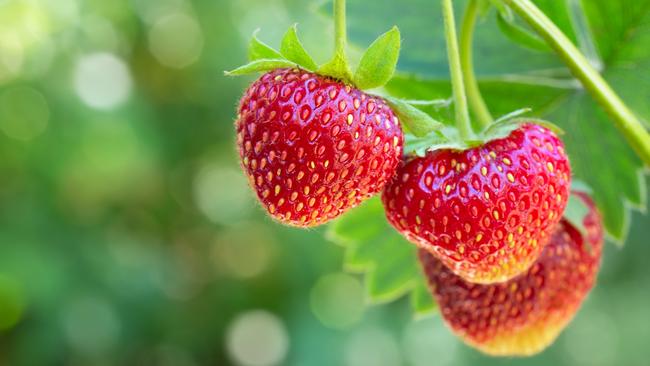
STRAWBERRIES
Often overlooked in favour of more fashionable blueberries and blackcurrants, strawberries – with 180mg of flavonoids per 100g bowlful – were ranked second on the Harvard list of fruit and vegetables that have the power to influence brain health.
Fisetin, a flavonol found in strawberries as well as in oranges, apples, peaches and grapes, has been shown to stimulate signalling pathways that enhance long-term memory.
They contain anthocyanins, and a study by nutrition scientists at the Human Nutrition Research Center on Ageing at Tufts University in Boston reported that low intake of strawberries and other berries was associated with a fourfold risk of developing Alzheimer’s and related dementias over 20 years.
OLIVE OIL
Perhaps a surprising entry, but Holland’s study praised its levels of a flavonol called isorhamnetin, which protects against brain degeneration, as well as others including the flavonoid luteolin – shown to have anti-inflammatory properties that reduce the risk of Alzheimer’s – apigenin and flavones important for general cognitive function.
Half a tablespoon (7g) of olive oil daily resulted in a 29 per cent reduced risk of early death from neurodegenerative disorders, including Alzheimer’s, according to a study by Harvard nutritionists published in the Journal of the American College of Cardiology last year.
The Times







To join the conversation, please log in. Don't have an account? Register
Join the conversation, you are commenting as Logout